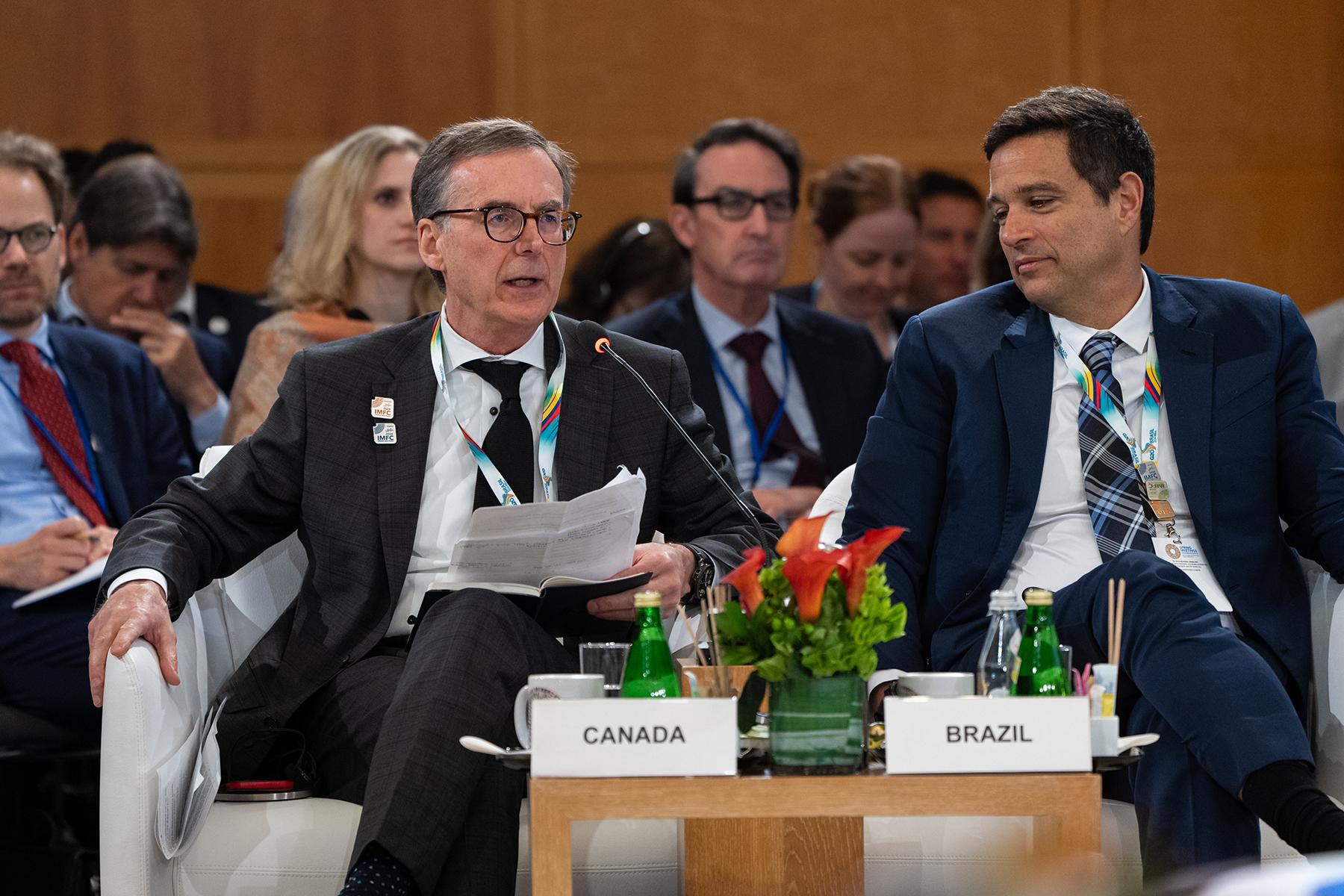
Global engagement
The Bank of Canada and its international counterparts faced important challenges in 2024. Several interconnected factors contributed to heightened uncertainty in the global economy:
- geopolitical tensions and ongoing conflicts in the Middle East and Ukraine
- shifting trade relationships
- emerging risks from rapid financial and technological innovation
- economic shocks related to climate change
At the same time, the combination of high levels of sovereign debt and elevated long‑term interest rates intensified vulnerabilities in the global financial system. Against this backdrop, the Bank used its influence to help drive global discussions, emphasizing that:
- a joint commitment from G20 central banks is essential for lowering inflation and anchoring inflation expectations
- effective and legitimate multilateral institutions are critical to the soundness of the global monetary and financial systems
- non-bank financial institutions—including those across international borders—are increasingly important sources of systemic financial risk
- a common approach is needed to address non-market policies and practices and promote a level playing field
The Bank also prepared for Canada’s G7 presidency in 2025. In its participation in global groups and forums—such as the International Monetary Fund, the Basel Committee on Banking Supervision, the Committee on Payments and Market Infrastructures, and the Financial Stability Board—it advocated for issues that matter to Canada.

Governor Tiff Macklem and colleagues meet with Gita Gopinath, First Deputy Managing Director of the International Monetary Fund (IMF), and other IMF officials in October.
Credit: IMF Photo / Lewis Joly
Collaborating to promote resilience across borders
Promoting economic and financial system resilience was central to the Bank’s international work in 2024. The Bank and its partners were increasingly focused on economic fragmentation. Climate change, cyber security and technological innovation were other key topics of discussion.
Addressing common challenges to shared prosperity
Governor Macklem explored some of these challenges in his September speech at the Canada–UK Chamber of Commerce.1 There, he focused on the geopolitical, economic and social forces reshaping global trade, which are of keen interest to small, open economies like Canada.
The Governor used his remarks to underscore the benefits of global trade, including shared prosperity. He emphasized the importance of effective multilateral institutions, as well as the need for a stable, open and rules‑based global order.
Working together to assess the economic and financial stability risks posed by climate change
The economic and financial stability risks from climate change have important implications for Canada and the international community. In 2024, central banks continued to collaborate on a range of climate‑related risks through their participation in the G7 group on the economic impacts of climate change and the Network for Greening the Financial System (NGFS). The Bank played an important role in creating an NGFS handbook for incorporating climate considerations into macroeconomic models used by policy‑makers.
As part of its work with the G20, the Bank emphasized that central banks’ core mandates of price and financial stability are important prerequisites for an orderly transition to net-zero emissions.
Enhancing resilience to cyber security risks
The Bank remained actively involved in the G7 Cyber Expert Group (CEG), which coordinates cyber security policy and strategy. In April 2024, CEG members participated in a cross-border exercise to test their ability to communicate and coordinate responses to a significant international cyber incident affecting the financial sector.
In September, the CEG published recommendations for addressing risks to the financial sector posed by quantum computing.2
Responding to challenges and opportunities in the world of payments
The Bank and its global partners continued to proactively address the risks and take advantage of the opportunities posed by financial innovations.
In 2024, Governor Macklem co‑chaired the Regional Consultative Group for the Americas (RCGA), a Financial Stability Board (FSB) forum that facilitates dialogue between members and non-members of the FSB. The RCGA continued working to promote the adoption of the FSB’s recommendations for regulating cryptoassets among non‑members. This work aims to mitigate risk, promote regulatory consistency and reduce regulatory arbitrage.
The international community continued to implement the G20 roadmap for enhancing cross-border payments. As chair of the Financial Stability Board’s Taskforce on Legal, Regulatory and Supervisory matters, Senior Deputy Governor Rogers led consultations with the private sector on challenges with implementing the roadmap.

Governor Tiff Macklem speaks at the International Monetary and Financial Committee plenary session during the 2024 Spring Meetings of the International Monetary Fund and World Bank Group.
Credit: IMF Photo / James Mertz
Exploring the potential of artificial intelligence and non‑traditional data
In 2024, the Bank spearheaded the G7’s work on artificial intelligence (AI), supporting the Italian G7 presidency in identifying opportunities and risks. In addition, through its leadership of the G7 Central Bank Digitalization Working Group, the Bank helped foster a common understanding of how AI tools can be used to support central banks as they deliver on their mandates.
The Bank also contributed to international discussions about how non‑traditional data, advanced analytics and AI tools can inform monetary policy. In September 2024, Governor Macklem delivered remarks at a conference about the economics of AI hosted by the National Bureau of Economic Research.3 He explored how AI could:
- impact the economy
- affect monetary policy
- be used as a tool for untangling large and disaggregated datasets
Preparing for Canada’s G7 presidency
The Bank and the Department of Finance Canada worked together to prepare for Canada’s G7 presidency in 2025. They advanced work on the G7 Finance Track, which is a key input to the Leaders’ Summit.
The Bank also expanded its bilateral engagement to collect input from both G7 and non‑G7 countries. As well, it worked closely with South Africa, the G20 president in 2025, to strengthen the partnership between the two countries and identify areas for collaboration.
Looking forward
In 2025, the Bank will:
- collaborate with peers to advance central banks’ tools and understanding of the economic and financial effects of climate change, economic fragmentation and geopolitical tensions
- strengthen partnerships to promote multilateral responses to shared challenges
- support international work that strengthens prudential bank regulation and the push for coherent international policy frameworks for digital assets and payments
- work with G7 members on key areas linked to central bank mandates and that leverage the Bank’s analytical expertise, including:
- advancing understanding of how AI could affect economic performance and productivity across jurisdictions
- improving resilience and responsiveness to financial stability risks from a range of sources, such as cyber security, AI and non-bank financial institutions
- developing a shared G7 vision for the future of global payment systems and supporting the G20 roadmap for enhancing cross-border payments
- work closely with Finance Canada on Canada’s activities in the G7 Finance Track
- co-host G7 Finance Track events, as well as chair and co-chair several G7 working groups
More information
Statement from the G7 Finance Ministers and Central Bank Governors’ meeting, Stresa, Italy, May 2024
Statement from the G7 Finance Ministers and Central Bank Governors’ meeting, Washington, DC, United States of America, October 2024
Communiqué from the third G20 Finance Ministers and Central Bank Governors Meeting, Rio de Janeiro, Brazil, July 2024
Communiqué from the fourth G20 Finance Ministers and Central Bank Governors Meeting, Washington, DC, United States of America, October 2024
- 1. See T. Macklem, “Rewired, recast and redirected: Global trade and implications for Canada” (speech to the Canada‑UK Chamber of Commerce, London, United Kingdom, September 10, 2024).[←]
- 2. See US Department of the Treasury,“G7 Cyber Expert Group Recommends Action to Combat Financial Sector Risks from Quantum Computing,” (press release, Washington, D.C., September 25, 2024).[←]
- 3. See T. Macklem, “Artificial intelligence, the economy and central banking” (speech delivered to the National Bureau of Economic Research, Economics of Artificial Intelligence Conference, Toronto, September 20, 2024).[←]